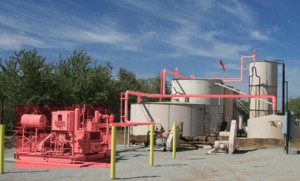Americans often react to problems with a conclusion that “there ought to be a law.” But on occasion, we get so wrapped up in the process of making law that we forget what the problem was. This is especially dangerous at the federal level, where the rulemaking process takes so long that the problem may have been solved already.
A good example is a new set of rules proposed by the EPA to regulate methane emissions from oil and gas operations. These rules are aimed at an air quality problem that has been debated for years.
The proposal is intended to lower methane emissions from oil and natural gas wells by about 45 percent from 2012 to 2022, a task already being addressed by energy producers across the country. But rather than acknowledge the industry’s voluntary efforts, which are paying off in a big way, national environmental activists and the EPA still prefer top-down, heavy-handed federal rules. One activist recently wrote that “Without these regulations, we know industry won’t take comprehensive action to address the methane problem.”Actually, we don’t have to rely entirely on the good will of the corporate world, because reducing such emissions are clearly in their own self-interest. That’s why even the EPA reports that methane emissions from oil and gas systems are declining, negating the need for new regulations. A September 2014 report showed that methane from oil and natural gas systems fell 12 percent between 2011 and 2013, “with the largest reductions coming from hydraulically fractured natural gas wells, which have decreased by 73 percent during that period.” These decreases are especially significant, given that they occurred during an almost unprecedented drilling boom.
Some of these reductions can be attributed to earlier regulations, of course, though much of the decline was due to voluntary efforts, including “green completions” in which methane is captured, processed, and sold as fuel. Many drilling companies began using green completions more than a decade ago.
The reason such voluntary efforts work is not only because energy companies are public-spirited people, though most of them are. In fact, oil and gas operators have no incentive to allow methane to dissipate into the air because it is worth money. If they can capture it, they can sell it as a key component of natural gas. Just as dairy farmers do not purposefully spill milk, the energy industry has no interest in spilling methane gas.
Last year Colorado became the first state in the nation to put strict limits on methane emissions from oil and gas operations. The State rules require industry to reduce methane leaks by 95 percent – both from existing wells and new wells, along with storage tanks and other facilities. By contrast, EPA’s new federal mandates target methane emissions only from new wells. In other words, the Colorado state rules are more comprehensive than the federal proposal.
So in our State, the proposed federal regulations are a solution in search of a problem. Instead of solving an issue we already addressed, the regulations will be an unnecessary nuisance, increasing energy costs with no benefit.
As Kathleen Sgamma, vice president of government and public relations for the Western Energy Alliance, put it, “The problem with EPA making mandatory what industry is already doing is that it simply adds bureaucratic layers that remove flexibility and innovation while discouraging the development of the single most significant source of U.S. greenhouse gas reductions.”
My own impression is that the proposed federal regulations have more to do with politics than mitigating climate change or any other environmental issue. Such regulations are dear to the national environmental lobby, and thus key to the flow of campaign funds. Is it a coincidence that the rules are expected to take effect during the coming 2016 election year?
In fact, these methane regulations are out-of-date before they are completed, demonstrating another clear example of Washington regulators being behind the times. Perhaps the rules took so long to write that they simply didn’t notice the need had evaporated. As Rachel Bunzey of EnergyInDepth noted, technology is “advancing faster than natural gas opponents, who are always debating yesterday’s issues. They’re still talking flaring and open pits, while the industry has moved well beyond both.”
We used to file memos sometimes, noting at the top the acronym OBE – “Overtaken By Events.” The problem discussed had already been solved, so the memo was no longer needed. Perhaps the next Administration should use “OBE” on such plans.
(A version of this column originally appeared in the Grand Junction Daily Sentinel October 2, 2015)





Comments on this entry are closed.